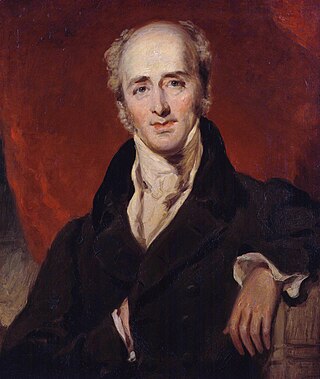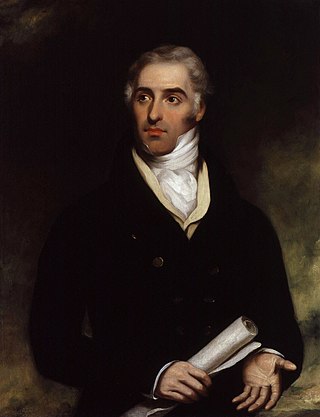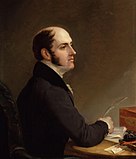The Whigs were a political party in the Parliaments of England, Scotland, Ireland, Great Britain and the United Kingdom. Between the 1680s and the 1850s, the Whigs contested power with their rivals, the Tories. The Whigs became the Liberal Party when it merged with the Peelites and Radicals in the 1850s. Many Whigs left the Liberal Party in 1886 over the issue of Irish Home Rule to form the Liberal Unionist Party, which merged into the Conservative Party in 1912.

The Representation of the People Act 1832 was an Act of Parliament of the United Kingdom that introduced major changes to the electoral system of England and Wales. It reapportioned constituencies to address the unequal distribution of seats and expanded franchise by broadening and standardising the property qualifications to vote. Only qualifying men were able to vote; the Act introduced the first explicit statutory bar to women voting by defining a voter as a male person.

Edward Baines (1774–1848) was the editor and proprietor of the Leeds Mercury, politician, and the author of historical and geographic works of reference. On his death in 1848, the Leeds Intelligencer described his as "one who has earned for himself an indisputable title to be numbered among the notable men of Leeds".

The Speaker of the House of Commons is the presiding officer of the House of Commons, the lower house and primary chamber of the Parliament of the United Kingdom. The current speaker, Lindsay Hoyle, was elected Speaker on 4 November 2019, following the retirement of John Bercow. Hoyle began his first full parliamentary term in the role on 17 December 2019, having been unanimously re-elected after the 2019 general election.

Charles Manners-Sutton, 1st Viscount Canterbury, was a British Tory politician who served as Speaker of the House of Commons from 1817 to 1835.

James Abercromby, 1st Baron Dunfermline FRSE, was a British barrister and Whig politician. He served as Speaker of the House of Commons between 1835 and 1839, the first Scottish MP to hold that position.

The 1832 United Kingdom general election was the first United Kingdom general election held in the Reformed House of Commons following the Reform Act, which introducing significant changes to the electoral system.

Joseph Hume FRS was a Scottish surgeon and Radical MP.
A casting vote is a vote that someone may exercise to resolve a tied vote in a deliberative body. A casting vote is typically by the presiding officer of a council, legislative body, committee, etc., and may only be exercised to break a deadlock.

Edward John Littleton, 1st Baron Hatherton PC, FRS, was a British politician from the extended Littleton/Lyttelton family, of first the Canningite Tories and later the Whigs. He had a long political career, active in each of the Houses of Parliament in turn over a period of forty years. He was closely involved in a number of major reforms, particularly Catholic Emancipation, the Truck Act 1831, the Parliamentary Boundaries Act 1832 and the Municipal Corporations Act 1835. Throughout his career he was actively concerned with the Irish question and he was Chief Secretary for Ireland between 1833 and 1834.
The Derby Dilly was a name given to a group of dissident Whigs who split from the main party under the leadership of Edward, Lord Stanley on the issue of the reorganisation of the Church of Ireland in 1834. Stanley and three others resigned from the cabinet of Lord Grey on this particular issue but other factors included their fear that the Whigs were appeasing their radical and Irish allies with further reforms.

John Fielden was a British industrialist and Radical Member of Parliament for Oldham (1832–1847).

William Sharman Crawford (1780–1861) was an Irish landowner who, in the Parliament of the United Kingdom, championed a democratic franchise, a devolved legislature for Ireland, and the interests of the Irish tenant farmer. As a Radical representing first, with Daniel O'Connell's endorsement, Dundalk (1835-1837) and then, with the support of Chartists, the English constituency of Rochdale (1841–1852) he introduced bills to codify and extend in Ireland the Ulster tenant right. In his last electoral contest, standing on the platform of the all-Ireland Tenant Right League in 1852 he failed to unseat the Conservative and Orange party in Down, his native county.

Michael Thomas Sadler was a British Tory Member of Parliament (MP) whose Evangelical Anglicanism and prior experience as a Poor Law administrator in Leeds led him to oppose Malthusian theories of population and their use to decry state provision for the poor.
Richard Sanderson was a British merchant, banker, and Conservative and Tory politician.

The 1817 election of the Speaker of the House of Commons occurred on 2 June 1817.

The 1835 election of the Speaker of the House of Commons occurred on 19 February 1835.

The House of Commons, 1833 is a large history painting by the British artist George Hayter. It depicts the first meeting of the House of Commons following the 1832 Great Reform Act and the subsequent general election that produced a landslide majority for the ruling Whig Government. In the Victorian era the painting was often known as The First Reformed Parliament.














